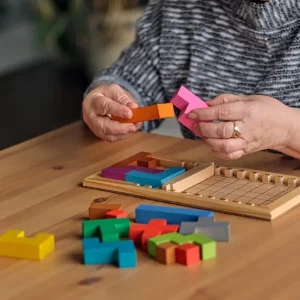Traumatic brain injury (TBI) can disrupt nearly every part of a person’s life, from cognition and memory to mood and mobility. While traditional therapies like physical rehabilitation and medication can help, many individuals continue to experience long-lasting symptoms.
In recent years, psychedelic therapy has entered the conversation as a potential tool for supporting emotional healing and brain recovery. But how does it work, and is it safe?
In this article, we’ll break down what psychedelic therapy is, why it’s being explored for TBI, and what we currently know about its potential benefits and risks.
A quick disclaimer before we dive in: This article is for informational purposes only and does not constitute medical advice. Psychedelic substances remain illegal in many jurisdictions and may carry risks, especially for individuals with a history of mental health conditions. Always consult a licensed medical professional before pursuing any new treatment, including experimental or alternative therapies. Flint Rehab does not endorse or provide psychedelic therapy.
What Is Psychedelic Therapy?
Psychedelic therapy involves the supervised use of substances like psilocybin, MDMA, LSD, or ketamine in a clinical setting to support mental health and emotional processing. Sessions are guided by trained professionals and are typically part of a structured therapeutic process.
This type of therapy is not recreational drug use. The focus is on creating a safe environment where patients can explore difficult emotions, improve mental clarity, and possibly unlock new paths to healing.
Psychedelic therapy is still experimental in most areas, but increasing research is drawing attention to its potential role in treating conditions like depression, PTSD, addiction, and possibly TBI.
Why Consider Psychedelic Therapy for TBI?
TBI often leads to long-term cognitive, behavioral, and emotional changes. Some of the most common challenges include:
- Depression and anxiety
- Mood swings
- Trouble focusing
- Personality changes
- PTSD
- Sleep disturbances
These symptoms can make daily life difficult and interfere with recovery. As a result, researchers have begun exploring psychedelic therapy for its ability to:
- Help individuals process trauma
- Reduce emotional distress
- Support neuroplasticity (the brain’s ability to rewire and adapt)
- Improve overall quality of life
At a high level, researchers believe psychedelics may complement, rather than replace, traditional rehab therapies. However, research into this area is still in the beginning stages.
The Science Behind Psychedelics and Brain Injury Recovery
There’s growing interest in how psychedelics interact with the brain. Let’s take a look at some of the most promising areas of research.
Neuroplasticity and Brain Connectivity
Substances like psilocybin and LSD appear to increase communication between regions of the brain that don’t usually interact. This may support neuroplasticity, a key factor in TBI recovery.
A 2018 brain imaging study revealed that psychedelics can help rebuild disrupted networks in the brain, which could be beneficial for individuals whose normal brain communication patterns have been affected by injury.
Emotional Processing
People with TBI often struggle to manage their emotions. This is especially true when the injury affects the frontal lobe, which helps regulate behavior and impulse control.
Psychedelics can create a window of emotional openness. This may allow individuals to process past trauma or reflect on their injury in a way that leads to emotional growth.
Anti-inflammatory Effects
Some studies suggest psychedelics have anti-inflammatory properties. Since inflammation in the brain can contribute to long-term TBI symptoms, this effect may add to their therapeutic value.
Current Research on Psychedelics for TBI
Although there aren’t many studies specifically targeting TBI, research in related areas is helping to build interest in this approach.
MDMA and PTSD: MAPS Research
The Multidisciplinary Association for Psychedelic Studies (MAPS) has conducted large-scale clinical trials using MDMA to treat PTSD. Their results have been promising, showing significant improvements in trauma symptoms.
Since PTSD often overlaps with TBI, this work has laid the groundwork for exploring MDMA-assisted therapy in brain injury recovery.
Psilocybin and Depression
Studies from institutions like Johns Hopkins have demonstrated that psilocybin can provide lasting relief from depression, even in cases that haven’t responded to traditional treatments.
Because many people with TBI experience treatment-resistant depression, psilocybin may offer a new option for symptom relief.
Ketamine and Suicidal Thoughts
Ketamine, while not a classic psychedelic, is frequently used in psychiatric settings to treat depression. It acts quickly and is sometimes used off-label for individuals with TBI who are struggling with severe mood disorders.
This treatment is already legal in some settings and provides an early example of how psychedelic-assisted therapy could be applied to TBI.
Types of Psychedelics for TBI Being Explored
Each psychedelic has its own effects and potential applications. Here’s a closer look at the most commonly studied options.
Psilocybin
- Derived from certain mushrooms
- May support emotional clarity and mood improvement
- Being studied for depression, anxiety, and addiction, with limited studies on its potential benefits for TBI survivors
MDMA
- Known for enhancing trust and emotional safety
- Used in trauma-focused therapy
- May help individuals process emotionally charged memories
LSD
- Can enhance cognitive flexibility and creativity
- May help rewire disrupted neural pathways
- Still under early investigation for therapeutic uses, but has shown potential as an alcoholism treatment
Ketamine
- Already used in some clinics to treat depression and pain
- Acts on glutamate pathways
- May offer fast-acting relief for TBI-related emotional symptoms
Potential Benefits of Psychedelic Therapy for TBI
Early studies and anecdotal experiences suggest several possible benefits of psychedelic therapy for individuals with brain injuries.
- Improved mood: Many users report decreased depression and anxiety
- Emotional insight: Patients often gain a better understanding of their challenges
- Trauma relief: Especially relevant for individuals with PTSD resulting from circumstances surrounding their brain injury
- Increased motivation: Feeling better emotionally can encourage participation in physical or cognitive rehab
Risks and Considerations of Psychedelic Therapy for TBI
Psychedelic therapy is not without its risks, especially for those with complex medical or psychological histories.
- Mental health history: People with conditions like schizophrenia or bipolar disorder may be more vulnerable to adverse reactions
- Unregulated access: Some clinics or retreats offer psychedelic therapy without proper safeguards
- Unpredictable experiences: Psychedelic effects can vary widely and may not always be pleasant
- Medication interactions: Psychedelics may interfere with other drugs commonly prescribed after TBI
As with any medical intervention, safety, supervision, and clear therapeutic intent are essential. Psychedelic therapy should only be performed in a closely monitored environment. Always discuss any new treatments you are considering with your doctor before beginning to review the potential risks and benefits for your specific condition.
Legal Status of Psychedelic Therapy
The legal status of psychedelic therapy is shifting. Most psychedelics are still classified as illegal at the federal level in the United States. However, local laws are beginning to change.
- Oregon has legalized psilocybin therapy under strict guidelines
- Colorado and other states are considering or implementing similar programs
- Ketamine is legal and currently used in medical settings, including psychiatric clinics
While these changes are promising, access remains limited, and most psychedelic therapies are still in the research or pilot program phase.
Looking Ahead
Psychedelic therapy is still in the early stages of acceptance, especially in brain injury care. But the research is growing, and attitudes are beginning to shift. With more clinical trials underway and legal access expanding, new opportunities could be on the horizon.
Anyone considering this path should proceed carefully, work with professionals, and stay informed as the landscape evolves.
Final Thoughts on Psychedelic Therapy and TBI
Living with the effects of a traumatic brain injury can be overwhelming, especially when emotional recovery lags behind physical healing. Psychedelic therapy offers a fresh perspective by supporting both mental health and brain flexibility.
Though it is not yet a mainstream treatment, it holds promise for becoming a useful option in the future. As research continues, it may one day be part of a more holistic approach to TBI recovery!









